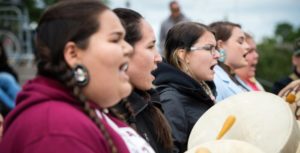Post-pandemic Canada should centre the needs of Indigenous women

The month of June barrels towards us with an important reconciliation anniversary, a recent lack of action in support of the approaching one year anniversary for the #MMIWG calls for justice, and a worldwide pandemic raining down on what would have been a national day of recognition and earnings for Indigenous makers, businesses owners and entertainers at events during National Indigenous Peoples Day on June 21.
Indigenous women worldwide have been increasingly taking up space, a slow and overdue move towards restoring what once was. Whether at the grassroots level, on social media, or in communities, First Nations, Inuit and Métis women are on the frontlines, bridging gaps of education, providing community support, leading and earning in business, fashion, health and wellness.
This June, KAIROS invites you to learn about some Indigenous women working to make change in Canada. Through profiles, spotlights and by sharing inspiration, we aim to raise up those working to live in a good way and to improve society for future generations. We’ve curated a month of features that will include the Mother Earth Resource Extraction Hub (MERE Hub)‘s Canadian phase launch, National Indigenous Peoples’ Day, and Ravens: Messengers of Change, which will ask Canadians to collectively embrace reconciliation education once more.
Questions of post-pandemic recovery abound, and the answers continue to echo at each fateful turn. What does it mean to put recovery in place for Indigenous women and children? It means something different to everyone. The pandemic recovery looks a lot like the pre-recovery plan — universal basic income, permanent remote work options, backyard space, food to eat, resources to pay bills, and the ability to choose to educate children on the land and to live without violence or fear. The pre- and post-recovery plans are unchanged, and we should consider what work was there before and still needs our attention.
What is a feminist response that Canada can offer? Canadians could offer support to those who continue fighting for space with the annual month of events known as Pride. Each June, 2Spirit, non-binary and Trans people celebrate and seek more public support in being visible. Too often, Pride erases Queer, Trans, People of Color (QTPOC) stories that inspired Pride month with history like the Stonewall riots.
For Indigenous people in Canada, 2Spirit identity carries spiritual teachings, gifts and responsibilities unique to communities and individuals, elemental to what once was. We cannot move towards reconciliation and safety for families, to divert numbers of missing and murdered, if we continuously and systematically undervalue members of our communities. Canadians must remain open-hearted and amenable to reflection, acceptance and ongoing change. It is human to innovate, adapt and evolve. It is logical to think that our perspectives should continuously be evolving too.
If government can agree to stop endangering Indigenous women and children by ending investments and actions that oppose their direct interests and well-being, it would be the cumulative, radical action we all wish to see. Can we urge those in power to directly imagine their own loved ones impacted the way Indigenous families have been? Will Canadians imagine what it must be like to belong to a family that has been impacted, every generation, for hundreds of years? Indigenous family trees built by great grandparents who lived on the land, their children removed to attend residential schools, and removed by child welfare and adopted into settler families. How can Canadians understand that this battle to keep our children is waged inter-generationally by Indigenous families? The fight for safe homes and healthy children is the on-going and very real battle waged by Indigenous women every day. Racist policies carried along with colonization are interwoven in Canadian institutions and uphold much of what needs to be dismantled. Without the courage to address these harms we are far from where we need to be.
Canadians can face the broken systems governments insist must be upheld though corporate bailouts, and economic priorities must change. How do we appropriately centre the needs of Indigenous people? Respect their basic rights to live, safe and free to feed and house their loved ones, sustain their families as their ancestors did once before; Implement the United Nations Declaration of Rights for Indigenous Peoples.
This pandemic has seen more injustices unfold in relation to Indigenous people, and governments continue to develop and uphold barriers to their rights. How can we move towards recovery when the fragility surrounding pre-COVID-19 systems remain centered, rather than the work that needs to be done?
While Indigenous Women’s Month at KAIROS aims to celebrate Indigenous women and the hard work they are doing, we do not forget the battles of the past, present and future. Indigenous women are the generals in this battle of healing. The war has been waged but their spirits will ensure that no obstacles are too great to overcome.
Please check the Indigenous Women’s Month at KAIROS’ calendar and our social media channels for stories, features and updates: Facebook and Twitter.
#MEREHUB #Indigenouswomen #Indigenouslanddefenders #Ravensmessengersofchange #TRC #TRC5
Chrystal Waban is the Indigenous Rights Coordinator at KAIROS Canada and a passionate Omàmiwininì Seedkeeper at Wananoshka Mashkiki and founder of Blackbird Medicines.
